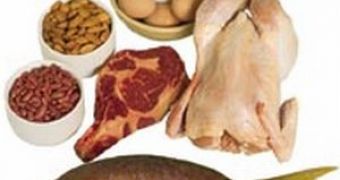Scientists have discovered the "secret" that makes high-protein diets so efficient when it comes to losing weight. The team from University College London found that high protein intake leads to the production of the peptide YY (PYY) in the body. The PYY peptide is a protein which, in high amounts, prevents hunger sensation and reduces appetite. This is why people who are on diets rich in proteins do not feel the need of eating very often, because the PYY protein provides them with a satiety sensation.
In the study, researchers made genetically engineered mice that could not produce the PYY protein. Obviously, mice lacking the appetite-reducing protein ate more than normal mice and became obese, even when they were fed with high in protein foods. Therefore, low levels of PYY peptide in the body increases appetite and causes animals and humans to eat more and gain weight.
On the other hand, when scientists started to give the engineered mice PYY protein treatment, the animals' appetite decreased, they started to eat less and lost weight. After the genetically modified mice became normal from obese, researchers withdrawn the PYY protein from their bodies and they gained weight and became obese again.
However, even if the current study presents data on how foods overloaded with proteins work against extra body weight, nutritionists do not recommend high protein diets, such as Atkins diet, to anyone. "No medical person is going to tell you to have all that saturated fat in your diet and no carbohydrates," warns Rachel Batterham who led the research. The Atkins diet is based on high protein and saturated fats intake to the detriment of carbohydrates.
Further trials are going to study how diets based on the consumption of lean meat, tofu, eggs and soy - all foods rich in proteins - work, informs the University College London team.

 14 DAY TRIAL //
14 DAY TRIAL //